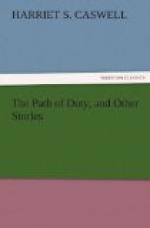Soon after my arrival, my aunt, one day, said to me,—
“I hope you will feel happy with us; for I wish you to consider our house as your home for the future. You know not,” she continued, “how glad I am of your company, and how your presence cheers us; we will gladly adopt you as our daughter, if you can be happy with us.”
I thanked her with tears in my eyes, and added that I was very happy in receiving so warm a welcome to their home, and would gladly do my utmost to fill a daughter’s place to them. I further informed my aunt that I should be very happy to consider her house as my home, but that I should prefer teaching, as soon as I could find a desirable situation, as such had been my intention when I left Philadelphia. But when I mentioned the subject to my uncle, he seemed much hurt that I should think of such a thing. I told him that the wish to teach did not proceed from any feeling of discontent in my home, but that I thought it wrong to remain idle, while possessing an education which qualified me for usefulness. He replied that if I felt anxious to teach, we would talk about it the following spring; but, said he, you must think no more about it for this winter, at any rate; and so the subject was suffered to drop.
We led a very quiet life at my uncle’s that winter. We saw but little company, except that occasionally the wife of some neighboring farmer would drop in to take a social cup of tea with my aunt.
There was a maiden lady residing in the village of Littleton who was always a welcome visitor at my uncle’s residence,—her name was Miss Priscilla Simmonds. She was somewhat advanced in years, and of a very mild and prepossessing appearance. Upon the death of her parents, which took place many years before, she was left the owner and sole tenant of the house in which she lived. She lived entirely alone, and was considered a very valuable person in




